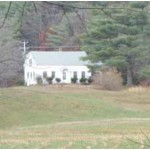Mysteries of Local History: The Murder of Julia Town Warren
By Cliff McCarthy and Paul Weigold
Specials to The Sentinel
There’s no way around it. This is a sad story. There’s no happy ending. It’s a story of poor people making poor choices and the consequences that ripple through generations. It came to me from Paul Weigold, a researcher in Connecticut who showed up at the Stone House Museum one day, investigating a 150 year-old murder.
Together, we peeled away the enveloping weeds of time.
Julia Town was born in Belchertown about 1841, though we can find no record of her birth. Her father, Asher Town, was a farm laborer, who had been struggling for a decade to get a stake in the American dream, but still had no land and no personal property to speak of. Her mother, Arabella, was busy raising Julia’s two older siblings. There would be three more children after Julia. Both Asher and Arabella were born and raised in Belchertown, but Asher was only distantly connected to the other Towne family, the prominent family, the ones who usually spelled their surnames with an “e”.
By the 1850s, the family was spiraling downward. Maybe Asher’s health was a problem; he was said to have had epilepsy. Or perhaps he suffered some injury. It is not recorded, but we do know that he and his family came under the town’s care and they were living at the almshouse. In 1850, nine year-old Julia was living, not with her parents, but in the home of Josiah Olds of Greenwich, Mass., one of the now-drowned Quabbin towns. She was probably “hired out” by the town. In those days, they would place children that were wards of the town in local families who would support them in exchange for their labor. In 1855, Julia’s three youngest siblings, girls aged four to nine, were living in the household of Asahel Lamson in Belchertown.
Maybe Julia saw marriage as one way out of her situation. In November 1856, she married John P. Warren, a farm laborer from Connecticut who was working in Belchertown. Julia had just turned 15 years but she claimed she was pregnant with Warren’s child. She was described by one journalist as “under medium size, with full bust, rosy cheeks, dark brown hair, blue eyes, and withal quite pretty.” The same newspaper reported of Warren that “he ran away from home when a boy, and has not sustained a very good character since.” Under pressure, Warren, who was only 17 years old himself, agreed to accept responsibility and a marriage was hastily arranged by Belchertown’s Judge Franklin Dickinson. County sheriff Henry Longley performed the ceremony. A few days later, Warren was arrested for larceny and sentenced to 30 days in jail.
No child came to the couple, however, and John Warren felt he had been tricked into marrying Julia Town and they began quarreling.  The couple moved from place to place until they settled on a farm in Willington, Connecticut, owned by Martin Hancock (pictured here). John found work on the Hancock farm, where he became acquainted with the three Hancock daughters. The oldest daughter, Lovinia, was 17, and John soon developed an intimacy with her. The middle daughter, Emma, 12, was also attracted to him. Further, it was known that his new wife was jealous of them both.
The couple moved from place to place until they settled on a farm in Willington, Connecticut, owned by Martin Hancock (pictured here). John found work on the Hancock farm, where he became acquainted with the three Hancock daughters. The oldest daughter, Lovinia, was 17, and John soon developed an intimacy with her. The middle daughter, Emma, 12, was also attracted to him. Further, it was known that his new wife was jealous of them both.
On June 2, 1859, in mid-afternoon, Julia was called out to the field that her husband was plowing. Warren didn’t say what he wanted, but such a request was not unusual. What was unusual was that Julia never returned. For several days, no one raised an alarm – the Hancock girls said she must have gone to a neighbors’ place. But by June 6th, suspicions were aroused in Willington. When questioned, Warren gave authorities an alibi that quickly unraveled. Someone wrote to Judge Dickinson in Belchertown of Julia’s disappearance and, when Warren returned to Massachusetts in connection with his larceny case, he was detained in the Northampton jail.
 Meanwhile, it took two weeks before an organized search, involving about 75 men, was conducted in Willington. Eventually, thanks to a tip from a railroad conductor, Julia’s body was found in a wooded area near a river just over the Ellington town line. The body was badly decomposed and clearly had been dragged and dumped at that location. It was plain to see that she had not died from natural causes. Warren was lucky to have been in custody or he might have been strung up by the mob. An inquest was held and testimony taken. When interrogated in jail by Massachusetts authorities, John P. Warren confessed to murdering his wife. Warren was extradited to Connecticut to stand trial.
Meanwhile, it took two weeks before an organized search, involving about 75 men, was conducted in Willington. Eventually, thanks to a tip from a railroad conductor, Julia’s body was found in a wooded area near a river just over the Ellington town line. The body was badly decomposed and clearly had been dragged and dumped at that location. It was plain to see that she had not died from natural causes. Warren was lucky to have been in custody or he might have been strung up by the mob. An inquest was held and testimony taken. When interrogated in jail by Massachusetts authorities, John P. Warren confessed to murdering his wife. Warren was extradited to Connecticut to stand trial.
Julia’s father, Asher Town, passed away in the Belchertown almshouse on June 11. That was after his daughter went missing, but before her body was found. The cause of his death was given as an “epileptic fit,” but we are left to wonder what impact his daughter’s disappearance had on his health.
Julia’s younger sister, Emily Sophronia Town, was also in trouble in Belchertown. She had been sent to the State Industrial School for Girls for setting fire to Lyman Hannum’s barn, near Dwight Station, about a year before. Hannum lost thirteen head of cattle, a young horse, and several swine in the arson. His loss was estimated at $2500. The Industrial School for Girls at Lancaster, Massachusetts, opened in 1854, was a product of the social reform move- ments of the nineteenth century and strove to create a wholesome, family atmosphere – rather than incarceration – for youthful lawbreakers and vagrants. It emphasized the teaching of useful skills and proper behavior to help the girls rise above their circumstances. By the end of the century, such schools had become commonplace, a method that many states continue to implement today.
In August of 1859, while awaiting trial in Tolland county jail, Warren escaped. There are several different versions of what happened, but a $200 reward was offered by the county for his return. He was apprehended within 30 miles of the jail.
At his trial in December, Warren plead for his life. He told how he suggested to his wife, on that warm June day, that they walk down to the brook that bordered the field he was plowing and encouraged her to take her shoes and stockings off to cool her feet in the water. Once they were in the stream, Warren seized Julia and held her head under the water until she breathed her last. He loaded her body into a borrowed wagon and, covering her with “sacks and bagging,” drove to the isolated place in Ellington where her body was later found. His confession earned Warren a sentence of life in prison instead of the gallows. He was five days past his 21st birthday.
John Warren spent the next 53 years in the Connecticut state penitentiary at Wethersfield. At that time, he was believed to have spent more time behind bars than any other prisoner in the nation. Once incarcerated, Warren became a model prisoner, learning the skills of a cobbler, working in the warden’s garden, and weaving baskets for sale. “He became a trusty in Wethersfield for years, and has won the confidence and sympathy of all the prison officials,” the Springfield Daily News reported. His repeated applications for parole were denied, however, until 1912, when he was finally granted his freedom by the Board of Pardons. He was 74 years old. Ironically, he asked that his release be delayed by a couple of days until he could train a replacement for his prison duties. John P. Warren, the wife-murderer, went to live with his brothers and died a few years after his release. He was buried in the Storrs Cemetery in his native town of Mansfield, Connecticut.
So what happened to the rest of Julia’s family? Not surprisingly, the family’s poverty, the Civil War, and Julia’s tragic death combined to present a picture of fractured families, out-of-wedlock children, and infant deaths. Julia’s youngest sibling, Delia, died in Belchertown of consumption at age 21.
Her only brother, and the oldest sibling, was Harrison D. Town. Already the parents of a child, Harrison Town and Melissa Bolton married in 1861, before he joined the Union Army to fight in the Civil War. While he was away, both of his little children died. He returned in 1864 and rejoined his wife, who had been supported by Belchertown during the war. Melissa died three years later at age 29. Harrison remarried the following year and his second wife gave birth to a daughter, but the marriage didn’t last. He married for a third time and fathered two more children. Harrison Town died in 1894 and is buried in Rural Cemetery in Belchertown with his first wife and two infant children.
Mary was older than Julia by a couple of years. With a child on the way, Mary married David Lemon of Ludlow in 1858. The infant died. The couple had three more children, though, before Lemon joined the Union Army in August of 1862. Within three months of his enlistment, two more of his children had died in Belchertown. David was discharged for disability in 1863. Another child would be stillborn before David Lemon, himself, passed away in 1875. Only two of the couple’s children survived. Mary remarried in 1877 and had one more child, Harry Asher Chapin, who would, ironically, manage the Greenfield town poor farm.
Lucy, younger than Julia by about seven years, had a child out of wedlock in 1863 of whom nothing more is known after 1865. Lucy married in 1867 to David Tewell, a spinner in a woolen mill in Holyoke, where the couple lived for a time. The marriage lasted 35 years until David’s death in 1902, but apparently they had no children together.
Emily Town, the wayward sibling who spent part of her youth in reform school, seems to have led a relatively normal, if short, adult life. She apparently returned to Willington to marry Solomon Haskell of Coventry, Rhode Island, in 1864. The couple then moved to Providence and raised two boys to adulthood before she passed away in 1892 at age 46. Ironically, her body lies in the Storrs Cemetery in Mansfield – the same cemetery where her sister’s murderer was buried in 1916, having outlived them all.